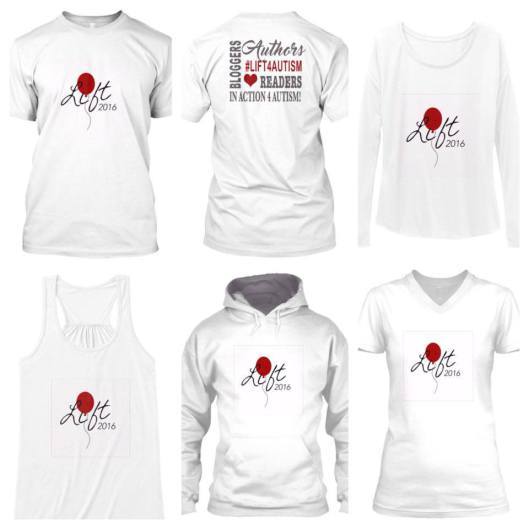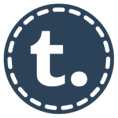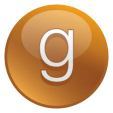A.L. Butcher's Blog, page 158
May 14, 2016
Author Interview 110 – Deborah Dixon – spec fic
Welcome to Deborah Dixon
Hi! Glad to be here! Figuratively speaking.
Where are you from and where do you live now?
I’m from Kingston, Jamaica. Currently I live in New Orleans, Louisiana, USA.
Please tell us a little about your writing – for example genre, title, etc.
Mostly I write under the wide umbrella of speculative fiction – fantasy, scifi, paranormal, that sort of stuff. I like to mix them together a bit – for example, one of my characters is an AI engineer and also part Fae – and put them in a familiar, modern setting (usually New Orleans, because the city’s already weird enough for it!).
Where do you find inspiration?
Everywhere. In conversations, in music, in things I see.
Are your characters based on real people?
A few of them have certain qualities based on people I know, but that’s mostly it. If an actual person I know shows up in one of my works, it’s probably for laughs.
Have you ever used a person you don’t/didn’t like as a character then killed them off?
I have not – at least not in my writing. I am very guilty of doing this in the various iterations of The Sims games.
Research can be important in world-building, how much do you need to do for your books? Do you enjoy this aspect of creating a novel and what are your favourite resources?
I research everything from the science I’m referencing to the location of a hotel in Brazil. The amount of research depends on the work – for my novellas I mostly just spot-check my mythology, but for my sci-fi novel I’m reading a few books regarding artificial intelligence and the technological Singularity. My favorite resources, though, are people themselves. My best friend is a great one; she’s familiar with several religions and such practices, and helped me shape my portrayal of them.
Is there a message conveyed within your writing? Do you feel this is important in a book?
There’s a message in everything I write. To me it’s crucial. It is nice to have a little something just to entertain you now and then, like a Hollywood blockbuster with stuff blowing up, but this world is far too complex to sit in it and let its happenings flit on around you, especially if you’re a storyteller of any sort. Art should move people to think and act, in a positive way.
In what formats are your books available? (E-books, print, large print audio) Are you intending to expand these and if not, what is the reason?
At the moment, they’re only available as ebooks. This is due to the process my publishing company uses. They will be available in print eventually, and possibly as audiobooks too; it depends on the amount of interest there.
Do you self-edit? If so why is that the case? Do you believe a book suffers without being professionally edited?
I self-edit, but I also usually have another writer also look at my work as well. Having a second set of eyes is more important to me than someone who sells her/himself as a professional editor. They tend to disagree on so many things. Follow the advice of one and you’ll be lambasted by another. Best not.
Do you think indie/self-published authors are viewed differently to traditionally published authors? Why do you think this might be?
I think they were, only a couple of years ago. But that has changed, with more indie authors finding success and more Big Five authors stepping back to self-publish. There’s definitely more respect given to that group now.
Do you read work by self-published authors?
I read works that are well-composed and original and that make me think. I don’t pay much attention to how they were published.
What are your opinions about authors commenting on reviews? How important are reviews?
Reviews are crucial – they can draw a much bigger audience, because they lend your work credibility. They say, “someone has read this and has had thoughts on it.” Authors commenting on reviews can give excellent insight into the author’s process, which is always interesting, but an author should never, ever respond to a negative review. At all, even if it’s just to point out an inaccuracy. That’s a long road of bad impressions you really can’t afford to go down.
When buying a book do you read the reviews?
Depends on the book and who wrote each review. I dismiss any review written by The New Yorker or the Atlanta Journal-Constitution out of hand.
What are your reviews on authors reviewing other authors?
I don’t see much of a difference. Authors are readers too, just with a bit more insight.
What experiences can a book provide that a movie or video game cannot?
Movies and video games provide you with visuals. With book, the author describes the world in words, and you develop the visual in your head. That’s a very personal experience, because you don’t share the same visual with anyone else, not even the author. It’s pulled from your own experiences and perception.
What three pieces of advice would you give to new writers?
Just write. If you’re having trouble getting started, try using an outline, or start in the middle, or develop your characters with freewrites. But the important thing is that you are writing.
Don’t become a writer for the money, because if that is your motivation, you’ll likely never see a dime from it. Write because you love it.
Read while you write. “I don’t want such-and-such book to influence mine” is a lame excuse. Everything should be influencing your book. That’s research. (Now, don’t plagiarize any other books you might be reading, of course.)
What are your best marketing/networking tips? What are your worst?
Social media is your best friend, but not your only friend. There are resources out there for authors trying to market books (we as authors tend to be terrible at that). There are books and online articles on it, and you can study what other authors similar to you do as well. As for worst, social media is a double-edged sword. Always make a separate, professional account on any site, and do not connect it to your personal one. There are no secrets on the Internet.
Most authors like to read, what have you recently finished reading? Did you enjoy it?
I once said, after a certain set of books became popular, that I would never write a vampire story. (Actually, I ranted to several friends about it.) But I read Abraham Lincoln: Vampire Hunter a few years ago, and loved it; the supporting character, a vampire named Henry, is one of my favorite characters of all time. (And yes, I’m aware the book is satire. I saw the movie.) Just recently I noticed that the author had released a sequel that starred Henry – The Last American Vampire. It’s also historical fiction/satire in the vein of its prequel, but the character is even more outstanding. Suffice it to say I now have a vampire story in the works. (It’s not historical fiction, though.)
What are your views on authors offering free books?
Everyone loves free stuff. If it’ll get people to read, then by all means offer free books.
Do you have a favourite movie?
Many, but let’s go with Spirited Away because I’m in that kind of mood today.
Do you have any pets?
I have a sansevieria and a spider plant named Thing 1 and Thing 2, respectively. I’m told that they do not count as pets. However, since I care for them, and since they are actively plotting my demise, I think they do count.
Can you name your worst job? Do you think you learned anything from the position that you now use in your writing?
I had a position that was described to me as being “marketing,” but turned out to effectively be “sales.” The manager there was so irresponsible that I actually wound up in the Midwest with no hotel, food, or gas at one point. I didn’t learn anything that helped my writing, but I did learn how not to run a business.
Can you give us a silly fact about yourself?
Horror movies don’t scare me at all. Documentaries, however, scare the crap out of me; I can’t sit through one. Think about it: Documentaries are about things that ACTUALLY CAN and ACTUALLY DID happen. See?
Book links, website/blog and author links:
http://shalamarmedia.com (Shalamar, my publishing company)
https://twitter.com/Deboracracy (my professional Twitter)
https://shalamartanara.wordpress.com/ (our blog about writing and publishing)
https://www.facebook.com/shalamarllp/ (our Facebook Page)


May 13, 2016
Fantasy and Sci-fi in Society Guest Post – Deborah Dixon
Name: Deborah Dixon
Location: New Orleans, Louisiana, USA
How do YOU define fantasy/science fiction/heroism?
Fantasy generally involves the use of fantastic creatures and settings. Science fiction involves the use of fantastic (for now) technology. Obviously there can be major overlap between the two; that’s why I like the term “speculative fiction” to cover them both. As for “heroism,” I specifically don’t define it. More on that below.
How pervasive do you think fantasy/sci-fi is in our society today? Why do you think this is?
HBO’s most successful show is a high-fantasy epic. The Star Wars reboot came out as one of the highest-grossing films of all time. SF offers a special sort of escapism that society is searching for today, which puts SF writers in a very unique position.
Are these genres seen in a more acceptable light than they used to be?
I don’t think they were ever unacceptable. Perhaps sci-fi was at first, in the days of H.P. Lovecraft and Harlan Ellison and others (and that’s a very specific sort of sci-fi), but that’s way before my time. I could only offer hearsay.
What makes a ‘hero’? Would you say this definition is different within literature to real life?
Heroism is a concept that I find much too simplified in fiction as well as in real life. The definition varies from person to person – I doubt you’d find anyone over the age of five who would give the same answer. Is it a person who does good things? Perhaps, but what if they use undesirable means to do good things? Is it a person who obeys the law? Perhaps, but what if the person follows the law to the extent that other people are hurt? There is no basic definition one can put on heroism, or on villainy.
If you’re a writer how do you portray heroism in your books?
I don’t. I write characters who act based on their beliefs, their frames of reference, and their own capabilities. Whether any of my characters are heroes or villains I leave for my readers to decide. My first novel to be published specifically deals with this concept – of what makes a hero or villain, and who gets to decide who wears those labels. I personally do not label my characters as either (although for story reasons a few of my characters refer to themselves as one or the other. But it’s based on their perspectives of themselves.)
It has been argued fantasy is full of ‘tropes’ – what are your views on this?
Do you mean tropes or clichés? There’s a huge difference. Tropes are everywhere – in fantasy as much as your favorite romantic comedy and the last reality show you watched. They’re helpful writing tools in any genre or format. Clichés are tropes that are overused to the point of making a reader groan upon spotting one, such as the typical damsel in distress. Some fantasy writers do overindulge in clichés, but I would stop short of stating the whole genre suffers from them. Authors such as George R.R. Martin and Neil Gaiman have made an art of writing fantasy while shunning clichés or turning them on their heads.
Fantasy and science fiction used to be seen as very male-oriented, do you think this is still the case. Do you have any experience of this?
In terms of writers? The field is certainly more even between women and men in fantasy than it was a couple of decades ago. Sci-fi is probably still more male-dominated, but I suspect that’s by choice; the readership of sci-fi absent any significant romantic element tends to be decidedly male, and so men end up writing it as well, just as women are all over romance. I like being an obviously female sci-fi writer; it’s a novelty I can market. But as far as my work goes, I’d rather get past sex and gender and focus on the material.
How important are ‘facts’ in fantasy/science fiction – does something need to be plausible to be believable?
Facts provide a basis on which the writer can build plausibility. For example, if you take the care to explain a hierarchal society in ways that relate to the real world, that will make the action in your high-fantasy novel much more sturdy, and then you’ve built up trust with your reader once you decide to whip out the dragons and magic rings. The same goes for sci-fi; introduce some technology or science your readers are familiar with, and later they will be more likely to accept that the spaceship just traveled from Earth to the galactic north in two hours. Don’t just dump phlebotinum on them with a “they can do that because that’s how this book works” hand wave. You have to establish why they should accept the rules of your world/galaxy.
How has science fiction changed from the days of Mary Shelley and Jules Verne?
I personally consider Shelley and Verne to be general literary authors, not science fiction, but that’s due to technology pressing forward and the concepts they worked with no longer holding the novelty of impossibility they did when they were published. Hey, it’ll happen to me too some day. “Oh, the Singularity. I remember that fondly. How quaint.”
Fairy-tales, anthropomorphic personifications, mythical beasts and cultural fantastical persons are all about us – such as Santa Claus, St George, dragons and fairies – how vital are these for our identity? Are we who we are because of the myths our cultures hold?
It’s the other way around. Our myths and creatures exist as they do because we are who we are. There’s a reason so many widely spread cultures have such similar stories – we as human beings have a need to believe in a higher power, to create an origin story, to explain away the best and worst in ourselves through benevolent and malevolent beings. Agricultural societies always have nature deities. Hierarchal societies always have pantheons. And they’re still vital to us, even as psychology and science explain many of these things, because they appeal to our sense of imagination, and they give us something to lean on and hide behind.
What myths have influenced your work?
All the myths I know. My own background means my works focus most on Abrahamic stories, but I’ve included and toyed with elements from Celtic, Norse, Greek/Roman, and West African mythologies, and feature anything from shapeshifters to kami and all in between. One of my own characters sums this approach up succinctly: “Everything is true, at least in part. All anything needs is a believer.”
What are some in YOUR society/cultural identity, how are they perceived and why are they important? Why have they endured?
Jamaica’s stories as they exist now are mostly those brought over from Africa in the slave trade, such as Anansi, the spider who weaves all webs and tells all tales. The reason for those enduring probably has to do with African slaves needing to bring something over from their own lives (including vodou, which is not practiced in Jamaica, but it is in Haiti. Just for the record). Unfortunately, the mythologies that existed before European colonization are not enduring; they were oral traditions and very few of them were written down before the native islanders were wiped out. A large part of my ancestry is made up of people who were extinguished before their stories could be immortalized; I suppose that has something to do with my interest in writing and helping others to write as well.
Bio: Deborah Dixon is a lifelong writer residing in New Orleans. She has written nine novels, five novellas, and numerous short stories. She is also one of the three founders of Shalamar, a publishing company designed to help new writers. Aside from writing, she also composes music and promotes small business in her hometown.
Links:
http://shalamarmedia.com (Shalamar, my publishing company)
https://twitter.com/Deboracracy (my professional Twitter)
https://shalamartanara.wordpress.com/ (our blog about writing and publishing)
https://www.facebook.com/shalamarllp/ (our Facebook Page)


May 9, 2016
The Kitchen Imps – Now in audio!
Hurrah! I’m pleased to announce the Kitchen Imps is now available in audio! Narrated by J Scott Bennett the short story collection is just shy of an hour in length, so perfect for the commute to work.
#Kitchenimps #fantasy
The e-book is also now available on all the Smashwords associate stores.
The Kitchen Imps and Other Dark Tales – six short tales of mayhem and mischief.
Naughty imps, missing socks, cunning thieves and baffled gods feature in this collection of short fantasy fiction.
http://www.amazon.com/dp/B01DPJ5TQC
http://www.amazon.co.uk/Kitchen-Other-Tales-Fire-Side-Collection-ebook/dp/B01DPJ5TQC/
http://www.barnesandnoble.com/w/the-kitchen-imps-and-other-dark-tales-alexandra-butcher/1123756072
https://www.smashwords.com/books/view/627195
Audio narrated by J Scott Bennett
http://www.audible.com/pd/Fiction/The-Kitchen-Imps-and-Other-Dark-Tales-Audiobook/B01F7TR8Z8
http://www.audible.co.uk/pd/Fiction/The-Kitchen-Imps-and-Other-Dark-Tales-Audiobook/B01F7TRUVA/
https://www.amazon.co.uk/Kitchen-Imps-Other-Dark-Tales/dp/B01F7TRKJC/
http://www.amazon.com/Kitchen-Imps-Other-Dark-Tales/dp/B01F7TRA1K


May 3, 2016
Review – 1888 – London Murders in the Year of the Ripper
1888 – London Murders in the Year of the Ripper by Peter Stubley
#truecrime #LondonHistory #JacktheRipper
1888 is a year that entered history for all the wrong reasons – the Autumn of Terror was the time the unidentified serial killer known as Jack the Ripper stalked the streets of London. But these were not the only crimes in what was then the capital of the British Empire, and the primary trading port of the world.
This fascinating book recounts a whole year of killings; some were done in pitiful desperation, some for the usual reasons – greed or love, some were done on the spur of the moment, some were done in madness but all were tragic in their own way. In part this is a social commentary – almost all the killers and the majority of the victims were poor. This was a time without many rights for women or children, domestic violence was very common, families were often large and money was scarce. In, what was arguably, the most civilised city on Earth, life was cheap and crime was rife.
Most of these tragic tales are little known – forgotten by time, and overshadowed by the Ripper’s crimes. This is the first time I have seen some of these outlined, and I read a lot of true crime. The author deals with the subject sympathetically, non-judgementally and references particular articles, laws, biographies etc. It’s obvious a lot of research was done to select these accounts and to present them accurately, and in the context of the time. In the case of the Ripper, the author does not speculate on a possible perpetrator, as many crime writers do, he simply presents the facts and states that no one was ever identified as Jack the Ripper.
Overall I’d recommend this to readers of Victorian history, true crime, British history and those interested in the social commentary of the time.
5 stars
Amazon :https://www.amazon.co.uk/1888-London-Murders-Year-Ripper/dp/0752465430/
Goodreads: https://www.goodreads.com/book/show/1...


May 1, 2016
Author Interview 109 – Amanda Byrd
Welcome Amanda Byrd
Where are you from and where do you live now? I’m from Pennsylvania and now live in the state northerners vacation in, Florida
Please tell us a little about your writing – for example genre, title, etc. I write what I call non-fiction “real talk”. There’s quite a few “bad words” in my book(s), but they’re just words to me.
Where do you find inspiration? Real life experiences
Do you have a favourite character? If so why? There are no characters in my books, but I do have a favourite fantasy character. Drizzt Do’Urden. He’s so profound, and that profundity comes from the wonderful creator of him, R. A. Salvatore
Are your characters based on real people? They’re not exactly characters in the sense of character. I’ve used titles like “said co-worker” and such.
Have you ever used a person you don’t/didn’t like as a character then killed them off? If I ever write fiction, I’m sure I will J
Is there a message conveyed within your writing? Do you feel this is important in a book? My message is simple: being an adult is not fun. I write experiences and lessons learned and hope my readers can learn from those mistakes I’ve made or build off of them.
In what formats are your books available? (E-books, print, large print audio) Are you intending to expand these and if not, what is the reason? I go with e-books and paperback publishing. I am considering audiobook, but the interest hasn’t generated enough yet.
Do you self-edit? If so why is that the case? Do you believe a book suffers without being professionally edited? I do. It’s cheaper and I know what I want my book to look like, whereas a professional editor will try to change the entirety of the book. Also, I don’t think a book suffers without professional editing, but the ones that are professionally edited…may want to be edited twice. I’ve recently read some traditionally published books with horrible editing.
Do you think indie/self-published authors are viewed differently to traditionally published authors? Why do you think this might be? I think the acceptance of self-published/indie authors is growing at an exponential rate and people are starting to respect us more because they realize we can sometimes write better books.
Do you read work by self-published authors? I do as a member of an author review site
What are your opinions about authors commenting on reviews? How important are reviews? Reviews are extremely important. If you have minimal, that greatly lowers your chances of someone buying your book. As for the author commenting on the reviews, I feel that’s a great way to build reader relationships and exposure.
When buying a book do you read the reviews? Rarely
What experiences can a book provide that a movie or video game cannot? Use of imagination, which I feel doesn’t happen much in today’s world
What three pieces of advice would you give to new writers? I’ve really only got one piece of advice, and it’s this: If the urge to write strikes, no matter what you’re in the middle of, STOP AND WRITE! I’ve lost a lot of great material by putting writing off…and it’s not coming back.
What are your best marketing/networking tips? What are your worst? Facebook ads haven’t really done anything for me. I did join a local business association, which has really helped with networking. I’m a firm believer in word of mouth and face-to-face relationship building are the best.
Can you name your favourite traditionally published author? R.A Salvatore
And your favourite indie/self-published author? Don’t have one yet
What are your views on authors offering free books? I’ve done giveaways and not even gotten reviews for them, so I’m off the giveaway thing for a while.
Do you have a favourite movie? Hannibal
Do you have any pets? Yessir! Cats!
Can you name your worst job? Do you think you learned anything from the position that you now use in your writing? My worst job was the one I had while writing my first book. I’ve learned a lot about what I don’t ever want again in a job.
Can you give us a silly fact about yourself? I’m just a big kid with an organizational obsession. I goof off all the time and simply enjoy making people laugh.
Book links, website/blog and author links:


Author Interview 108 – Mary Ellen Quire
Welcome to Mary Ellen Quire
Where are you from and where do you live now? I’m from Kentucky and have lived there all of my life.
Please tell us a little about your writing – for example genre, title, etc. I have been plucking away at writing for quite some time. Sheldon’s Diary is my most recent book. I guess you could put in the young adult genre, although it does pretty well in Women’s Fiction. The stories are a mixture of action, adventure, light-hearted comedy and suspense. The entire book can be summed up by the burning question many animal lovers have had running through their mind, “What do they really do while you’re away?”
Are your characters based on real people? All of the humans in Sheldon’s Diary are based on real people and I would say that probably fifty percent of all the critters in the book are real. The other fifty percent come from a wild and woolly imagination.
Sort these into order of importance: Great characters; great world-building; solid plot; technically perfect. Can you explain why you chose this order? (Yes I know they all are important…) Great characters, without them you have nothing but an empty map.
Solid plot, readers need this as motivation to keep reading and as a reward for having travelled the journey with you. Writer’s need it because it’s probably the only bit of order that can be found in a mind swimming with possibilities.
Great world-building, it’s third because it can make for an awesome story, but for me as a writer I don’t believe it is absolutely essential. Many great books have been written with the background tucked nicely away in the background.
Technically perfect, is there such a thing?
In what formats are your books available? (E-books, print, large print audio) Are you intending to expand these and if not, what is the reason? Sheldon’s Diary is available in paperback and in the Kindle version. I would love to see it in Nook, but that will be later. Audio may also come in time.
Do you self-edit? If so why is that the case? Do you believe a book suffers without being professionally edited? I do self-edit, not because I’m an English whiz or anything, but because professional editing is very costly to me right now. Occasionally, I’ll have a friend do a once over for a manuscript to catch things I have missed. Do I believe a book suffers without professional editing? Sometimes, but I’ve read many books that have hit the shelves over the years, professionally edited, that still have mistakes.
Do you think indie/self-published authors are viewed differently to traditionally published authors? Why do you think this might be? Unfortunately, I do think there is a stigma place on indie/self-published authors. It’s one that seems to say, “Hey, you just weren’t good enough to publish with a real publisher, but you were definitely vain enough to pay for it.” What people do not realize is that books are rejected by traditional publishers for a number of reasons, not just because the story was inferior. For example, the publisher may have all of that type/genre of book they can handle at the time or they might not be able to make it sell. Publishing is a business after all, so you have to hit the right one with the right thing at the right time. It’s a crap shoot.
Do you read work by self-published authors? I’ve found several really good books/series through self-published authors. It just goes to show you that just because it trickles away from the traditional doesn’t mean it sucks.
What experiences can a book provide that a movie or video game cannot? Mostly I believe the book is always better then the movie/video game because you are allowed to really delve down deep into the character(s). You’re in their brains, mulling around in their thoughts and feelings, and you get a better sense of who they really are. You cannot do that in any other type of media.
What are your views on authors offering free books? I love the idea. I think it’s an awesome way get readers take a chance on your book and see if they not only enjoy that particular one, but the author’s style of telling a story.
Do you have any pets? Right now, I have four. Two of them are cats, Sir Sheldon and Sir Cheddar. One rat, Templeton. And then there’s my 15 year old Ball python, The Wheezer.
Book links, website/blog and author links:
www.facebook.com/sheldonsdiary



April 29, 2016
Get to Know Author A. L. Butcher @libraryoferana #fantasy #authorinterview #bookpromo
My latest interview!
 POTL: All Things Books, Reading and Publishing
POTL: All Things Books, Reading and Publishing
As many of you know, I’m a big fantasy reader, have been ever since I read Chronicles of Narnia by C. S. Lewis. Fantasy allows me to escape the hum-drum world of Earth and travel to a place where anything is possible. So when I meet a fantasy author I love, I want to tell you all about him/her. It’s my great pleasure to introduce you to British Fantasy Author A. L. Butcher. You may know her better as “Library of Erana”. She agreed to sit down with me for a candid interview. She reveals all sorts of sage advice and fascinating facts. Take it away, A. L.: [image error]
What book do you wish you could have written?
The Count of Monte Cristo. It’s a masterpiece of revenge, historical drama, intrigue and redemption. Fantasy wise – Soul Music, or Thud by Terry Pratchett. The late Mr Pratchett was a…
View original post 2,264 more words


This weeks featured Author is ~A.L. Butcher
Here’s my spotlight for author of the week

Author Bio:
A.L. Butcher is the British author of the Light Beyond the Storm Chronicles fantasy series, and several short stories in the fantasy and fantasy romance genres. She is an avid reader and creator of worlds, a poet and a dreamer. When she is grounded in the real world she likes science, natural history, history and monkeys. Her work has been described as ‘dark and gritty’ and her poetry as evocative.
The Light Beyond the Storm Chronicles series – an adult fantasy/fantasy romance series, with a touch of erotica.
The Light Beyond the Storm Chronicles – Book I
In a dark world where magic is illegal and elves are enslaved a young elven sorceress runs for her life from the house of her evil Keeper. Pursued by his men and the corrupt Order of Witch-Hunters she must find sanctuary. As the slavers roll across…
View original post 2,456 more words


April 28, 2016
Blog Tour – Bellona – Romance/Fantasy
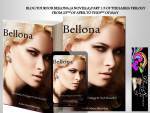

Blurb:
FROM AWARD WINNING AUTHOR AOIFE MARIE SHERIDAN
Bellona is a young princess who grows up in a world of privilege. A world of servants, banquets, and power. To others, she has everything. But behind the castle walls and locked doors things are very different.
Bellona is a damaged, dark and broken girl. Her mother is her number one tormentor. Her words break Bellona, while her father prefers his fists. Hate grows thick within Bellona and the servants become her toys – ones she can break and replace.
In this harrowing tale, we watch Bellona destroy everything around her, yet Nierra, the man who will become her husband, is the only hope she has. But will he be enough to save her?
Redemption will be sought,
Deaths will be repaid,
And somethings can never be undone.
Step back into Saskia again.
Purchase Links:
http://www.amazon.com/Bellona-Part-1-5-Saskia-Trilogy-ebook/dp/B01B1YQFAM/
http://www.amazon.co.uk/Bellona-Part-1-5-Saskia-Trilogy-ebook/dp/B01B1YQFAM/
https://www.amazon.ca/Bellona-Part-1-5-Saskia-Trilogy-ebook/dp/B01B1YQFAM/
http://www.amazon.fr/Bellona-Part-Saskia-Trilogy-English-ebook/dp/B01B1YQFAM/r
http://www.amazon.de/Bellona-Part-Saskia-Trilogy-English-ebook/dp/B01B1YQFAM/
http://www.amazon.co.jp/Bellona-Part-Saskia-Trilogy-English-ebook/dp/B01B1YQFAM/
OVERALL GIVEAWAY:
Paperback copy of:
Eden Forest (The Saskia Trilogy #1)
City of Secrets (The Saskia Trilogy #2)
The Rise of The Queeen (The Saskia Trilogy #3)
Hunters (The Demon Series #1)
E-Books:
Bellona (The Saskia Trilogy #1.5)
And a 20 dollar amazon gift voucher.
https://www.rafflecopter.com/rafl/display/ffe1a15711/
An e-book of Eden Forest
An e-book of Hunters
An e-book of Bellona
About the Author:
Bio
AWARD WINNING AUTHOR
Aoife Marie Sheridan has loved reading from a very young age, starting off with mills and boon books given to by her grandmother. Her love for romances grew; by the age of 14 she had read hundreds of them.
Aoife has a passion for writing poetry or in her eyes her journal entries. It was something she did throughout her teens and into her twenties. Aoife won first place for two of her poems and had them published at a young age of just nineteen.
Aoife’s first book Eden Forest (Part one of the Saskia Trilogy) took first place with Writers Got Talent 2013. Aoife continues to write tales of fantasy and romance.
To find out more about Aoife Marie Sheridan you can visit her at:
Amazon Page: http://www.amazon.com/-/e/B00B5W8SK6
Facebook: https://www.facebook.com/Aoifemariesheri
Website: http://www.aoifemariesheridan.com
or email her at aoifesheridan101@gmail.com
Blog: aoifesheri.wordpress.com
Goodreads: https://www.goodreads.com/author/show…;
Twitter: https://twitter.com/aoifesheri
Google Plus: https://plus.google.com/+AoifeMarieSh…;
Linkedin: http://ie.linkedin.com/pub/aoife-mari…;
Pinterest: http://www.pinterest.com/aoifesheri/
Mailing List: http://aoifemariesheridan.us7.list-ma…;
TSU: http://www.tsu.co/aoifesheri
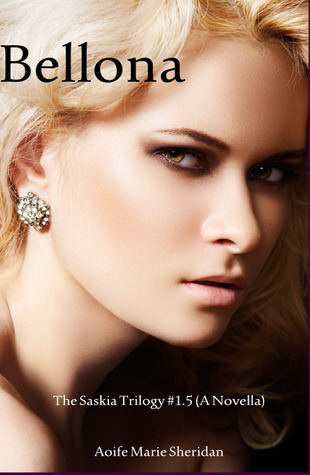


April 24, 2016
Lift 4 Autism – Promo/Auction
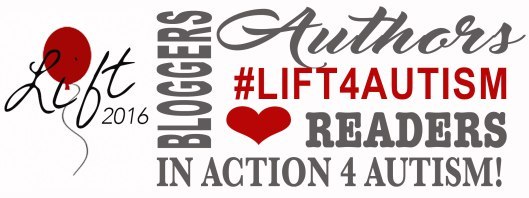
1 in every 68 children is diagnosed with Autism. 1 in every 42 Boys
The LIFT Campaign is a charitable initiative rallying the romance reading community around Autism Spectrum Disorder (ASD) families in April, Autism Awareness month. Experts estimate that many ASD families spend up to $60,000 out of pocket each year on medical and therapy expenses. This year we’re raising funds to assist families struggling to manage these staggering costs. All profits go to the family scholarship program of Talk About Curing Autism (TACA).
The online auction is LIVE! There are too many items from authors and bloggers up for bid to list here, but we have full signed collections from some of your favorite bestselling authors. We have non-book items like Kindle Paperwhite, Amazon Echo, VIP Tickets to the Mile High Denver author signing, and so many other goodies! So start bidding while doing good!
(Bidding closes Friday, 4/29/16!)
Even if you don’t want to bid, you can still make a tax-deductible donation to the scholarship program through our efforts HERE!
Don’t miss a thing! Join the LIFT 2016 Facebook Group for bidding alerts and campaign information.
Wanna stylishly support the LIFT Campaign? Buy your LIFT T-shirt before it’s too late!
All profits benefit TACA!
A special thank you from Lisa Ackerman,
Founder & Executive Director of Talk About Curing Autism (TACA)
